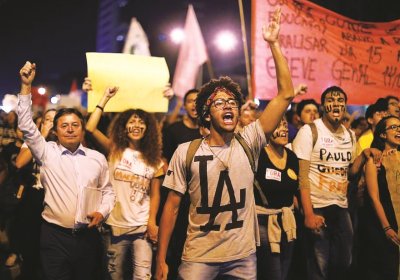"The Amazon rainforest has been burning for three weeks! We are on the verge of losing it completely if the fire isn't put out. The loss of trees, the loss of biodiversity is what is accelerating climate change."
Brazil
Since Brazil’s 2016 parliamentary coup d’etat, in which former president Dilma Rousseff was removed on a later-exonerated technicality, Brazil’s ultra-right-wing president Jair Bolsonaro has made every effort to destroy any remnants of the legacy left by the Brazilian Workers’ Party (PT).
Strikers stopped public transport, blocked roads and held street demonstrations in 380 cities across Brazil on June 14.
A nationwide education strike on May 15 became the platform for the biggest anti-government protests since President Jair Bolsonaro took power.
Brazilian solidarity activists rallied in Sydney on April 7.
Speakers called for the release of jailed former Brazilian president Lula Da Silva and spoke out against the far-right government of Jair Bolsonaro and its attacks on democracy.
On March 14, 2018 in the centre of Brazil’s Rio de Janeiro, two gunmen in a car murdered Municipal Chamber Councilor Marielle Franco and her driver, Anderson Pedro Gomes. Unlike most of the city’s political leaders, Marielle came from Rio’s favelas. And many of the favelas’ millions of marginalised and mostly black residents saw her as their champion.
A tailings dam owned by Brazilian iron ore producer Vale burst in Brumadinho in the state of Minas Gerais on January 25. This is the second of its tailings dams to burst in several years. Hundreds died and the devastation to local residents, water resources and biodiversity was immense.
The world’s biggest producer of iron ore, Vale, has again distanced itself from an ecological and workplace disaster of its own making, writes Pip Hinman.
Update: Since this interveiw was published by Democracy Now!. President Trump has recognized Venezuelan opposition leader Juan Guaidó as interim president, calling democratically elected President Maduro “illegitimate.” In response, Venezuela has cut diplomatic ties with the U.S., giving diplomats 72 hours to leave the country.
Brazil’s far-right government of President Jair Bolsonaro will seek to classify “invasions” of farmland by landless workers as akin to terrorism, with harsher penalties for the activists, an Agriculture Ministry official said on January 14.
Brazil’s Landless Workers’ Movement (MST), one of Latin America’s largest social movements, seeks to take over unproductive lands in the name of social and economic justice to more equally distribute rural wealth.
Brazil is going through a profound political crisis, probably more serious than the military coup in 1964 that ushered in 25 years of authoritarian rule, writes Sue Bradford.
After his election as president in October, the neo-fascist Jair Bolsonaro began selecting his ministers. His most important decision — and one that will probably change the destiny of Brazil for many decades — was to choose Paulo Guedes, an advocate of extreme free-market economics, as a super-minister, responsible for a hugely-expanded finance ministry.
In 2008, the prestigious Council on Foreign Relations published a report titled US-Latin America Relations: A New Direction for a New Reality. Timed to influence the foreign policy agenda of the next US administration, the report asserted: “the era of the US as the dominant influence in Latin America is over.”
Then, at the Summit of the Americas the next year, then-president Barack Obama promised Latin American leaders a “new era” of “equal partnership” and “mutual respect”.
- Previous page
- Page 5
- Next page











